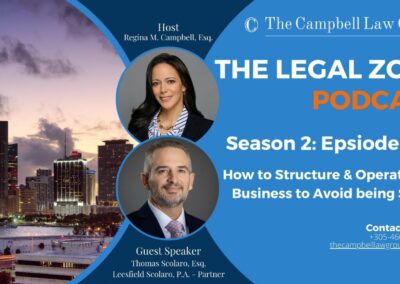The Campbell Law Group is well-equipped to serve businesses throughout Florida with all manner of legal matters. Our unique breadth of knowledge, thanks to a wealth of both business and legal experience, will provide you and your company with a well-rounded representation for all of your business’ legal needs. Though we cater to many small and mid-sized businesses, we are prepared to accommodate the needs of companies of all sizes—no matter how small or large.
Our firm can assist with the full life-cycle of your business, from startup or purchase to dissolution or sale, and everything in between. Our business and commercial law practice focuses on the following services:
- Corporate Formation and Incorporation
- Contracts
- Employment Documents















